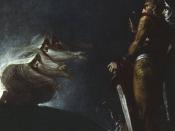Serizawa � PAGE �1�
Mizuki Serizawa
Mr. MacKay
ENG 3UO
13 November 2008
Macbeth's Wild Conscience
The level of conscience can make a deep impact on one's actions. Conscience is the attitude which informs one's moral judgment before he or she performs any action, whether it be moral or immoral. However, a person without a conscience has no limit either way. In order to determine the extent to which this applies to Shakespeare's Macbeth, one should consider that at the beginning of the play, Macbeth was a valiant soldier with a good, clear conscience. In the middle, Macbeth completely loses his conscience. In the end, Macbeth regains his conscience, but it is too late to save him from his downfall. Throughout the play, Macbeth experiences different levels of conscience. It is through his brilliant expression and knowledge of the human mind and conscience that Shakespeare is believed to be the greatest writer in the history of English literature.
During the beginning of the play, Macbeth clearly demonstrates that he has a conscience. Macbeth feels anxious and disheveled when he is named Thane of Cawdor. He knows deep inside that this was going against the natural order of things. This is proven when he says, "I am thane of Cawdor: If good why do I yield to that suggestion?" (1.3.143-144). He does not try to rationalize by pretending to himself that murdering King Duncan would be a good idea. In addition, he feels loyal towards Duncan and feels he should protect him. Macbeth initially told Lady Macbeth that "[They] will proceed no further in this business: / [Duncan] hath honour'd [him] of late; and [he] have bought / Golden opinions from all sorts of people" (Shakespeare 1.7.33-35). Macbeth appreciates the respect from Duncan and does not feel that Duncan deserves to be murdered. Although he has a clear conscience, his beliefs of manhood are stronger as is proven when Lady Macbeth is pressuring him to be a man and kill the king. The thought of killing Duncan makes Macbeth feel so guilty that he becomes paranoid and has a vision of a floating dagger that he cannot grasp. He wonders whether what he sees is real or a "dagger of the mind, a false creation / Proceeding from the heat-oppressed brain" (2.1.38-39). After Macbeth kills the king, he automatically knows that things are not going to get easier for him. He thought he heard a voice cry out: "Sleep no more, / Macbeth does murder sleep" (2.2.33-34). Those were the voices inside his head, his conscience feeling guilty. He knows that he will no longer be able to sleep at night after the horrible things he has done. Hence, in the beginning it is clear that Macbeth has a conscience, but it is in jeopardy, as his mind is corrupted by the witches' prophecies and his and Lady Macbeth's greed.
During the middle of the play, Macbeth exhibits the loss of his conscience. Macbeth becomes obsessed with securing his position as king and does not care what he has to do to get it, even if it means killing his friend Banquo. After planning Banquo and Fleance's killings with the murderers, Macbeth says, "Banquo, thy soul's flight, / If it find heaven, must find it out to-night" (3.1.157-158). Lucky for Fleance, he escaped but the damage was done. His father Banquo was dead. At this point he believes people who could jeopardize his plans must be exterminated. His conscience becomes even less evident when he resorts to killing MacDuff's wife and children. Likewise, Macbeth does not care when his wife commits suicide. He is completely narcissistic and has no feeling whatsoever for the Lady Macbeth's death. All he thinks of this is that: "She should have died hereafter" (5.5.19). Macbeth is basically saying that he has no time to deal with it right now, and that she should have died later on; that is, when he is not so busy. With his calm acceptance of his wife's death, Macbeth stoops so low that he feels that that there is no meaning or purpose in life. He feels no remorse for his actions because if everything is meaningless, then Macbeth's cruel murders are somehow made less cruel, because, like everything else, they too "signify nothing" (5.5.31). He almost envies Duncan and the others for dying. Therefore, it is apparent that in the middle of the play Macbeth demonstrates that he does not have a conscience.
During the end of the play, Macbeth regains his conscience. He takes his first step towards regaining his conscience when he says, "I have almost forgot the taste of fears" (5.5.10). He realizes he has changed for the worst because he cannot feel fear anymore. He feels as if he is no longer human. When Macbeth realizes that the witches' prophecies are coming true; Birnam Wood is moving into Dunsinane Castle and Macduff is not "woman born" he decides to fight till the death because he has nothing to lose and nothing to live for. He wants to live his last moments with as much pride as possible, as proven when he says "Why should I play the Roman fool, and die / On mine own sword?" (5.8.1-2). He knows he made big mistakes and will never be able to get away for them until his death. He wants nothing more but to be at peace. Furthermore, Macbeth admits he is ashamed of his actions, including killing Macduff's family and refuses to kill Macduff. He says, "Of all men else [he] have avoided thee: / But get thee back; [His] soul is too much charged / With blood of thine already" (5.8.5-7). He does not want to fight because he does not want to carry another burden if he ends up killing Macduff. Thus, in the end of the play, Macbeth becomes aware of his faults, and recovers his conscience.
In conclusion, Macbeth's changes of conscience deeply impact his actions throughout the play, from at the beginning of the play when he has a conscience, to the middle in which it evidently disappears, and in the end when he regains it, although it was too late. Macbeth pays dearly for his temporary change of conscience, when Macduff sought after revenge for the murders of his family, Banquo, Duncan, and the servants at the end by decapitating him. His wife commits suicide because she could not live with the thought that she convinced Macbeth to kill Duncan, which led Macbeth to yearn to kill others. Shakespeare has taught the audience that they should always be clear on what their morals are and not let someone else try to change them, or they may end up doing something terrible that they will regret later.
Works Cited
Shakespeare, William. Macbeth. Toronto: Harcourt, 2001.





